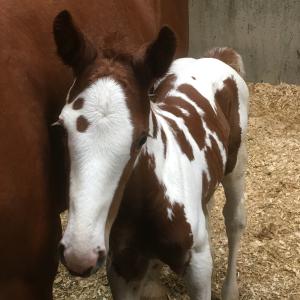
By vet Charlotte Pennington
Foals are especially susceptible to worms due to their immature immune system.
Parasite control should start with the brood mare by ensuring she has the appropriate worm treatments when needed. The pregnant mare should have regular worm egg counts in summer and have an appropriate winter wormer. There is a debate about whether worming her one month prior to foaling with an ivermectin-based product is necessary regarding threadworm prevention which can cause diarrhoea in young foals. But it is advised mares aren’t wormed in the 2 weeks post foaling.

Worm egg counts are less useful in young foals, and we assume that all foals will have some burden of parasites. Foals generally get their first wormer at around 10-12 weeks and then are wormed every 3 months or so until the age of around 18 months old after which they follow an adult worming plan.
What product is used at which time varies depending on the age of the foal and the time of year, so seek advice if unsure, as there are some wormers which are dangerous to younger foals. Moxidectin-based products must never be used in foals under 4 months of age and Praziquantel-based products shouldn’t be used in foals which are less than 6 months old.
It is always worth giving your vet a call to get advice tailored to you.
Worm control doesn’t just consist of regular worming regimes. Careful management practices can massively reduce the risk of getting problems.
Some good practices to follow include: putting foals onto ‘rested’ pasture (land that hasn’t had any other horses on it for a period of time, ideally 12 months); keeping stocking density low, 1 horse/acre is ideal; regular poo-picking; and avoiding harrowing the land, as this will simply spread the worm burden across it.